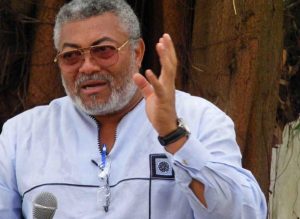Flight lieutenant Jerry John Rawlings has long held a complicated place in Ghanaian popular politics and historical memory.
On December 31, 1981, he was released from prison by junior military officers in another takeover, seizing power in a successful “housecleaning exercise” that sought to purge the country of corrupt political and business leaders and recalibrate Ghana’s national moral compass.
As military head of the junta in Ghana, he vowed to “organize his country in such a way that nothing will be done, whether by God or the devil, without the consent and the authority of the people.
As part of cleaning house, the Revolutionary Council executed eight senior military officers, including three former heads of state—Akwasi Afrifa, Ignatius Acheampong, and Akuffo.
Jerry John Rawling and his other compatriot political interventions sought to address the economic hardships experienced by the vast majority of Ghana’s population.
Rawlings’ rhetoric was ultimately moral rather than economic. Rediscovering and reasserting national morality was the only productive way forward.
Late JJ was credited as a driving force behind Ghana’s emergence as a stable democracy.
His tenure as leader of Ghana remains emblematic with the restoration of that country represented in a generation of leaders who gave their all for the rebirth of his country and Africa at large.
Ghanaian and the rest of African populaces will remember him as the liberator of the poor and corrupt Ghana. As a president, he liberalised Ghana’s economy, encouraging investment in the country’s oil and gold sectors.
He is a truly African leader that had little patience for mediocrity and zero tolerance for corruption.
In fact, Africa has lost one of the brightest and most progressive and charismatic leaders, giving his best to not only Ghana but also West Africa and indeed Africa.
Even after office, he stood tall for African unity and renaissance. He is a leader who preached and worked for the unity and emancipation of Africa from the clutches of poverty and underdevelopment.
Sometime last year he was trending on Twitter across the continent after getting out of his car to direct traffic in Accra. The acclaim for “Papa J” was overwhelming.
“This should be an example to all African presidents. You can serve your people, leave power with dignity, still live free and respected amongst your people,” one Twitter user stated.
For many this was another example of Rawlings’ humility as a “man of the people”—a phrase repeated often during and after the dictatorship to highlight the differences between himself and the average political leader.
Lieutenant Jerry John Rawlings was very unapologetically African and yearned so much to see Africa surmount her challenges and take her rightful place in the comity of nations.
He could well be referred to as the catalyst of modern Ghana, who put the West African nation on the path of the development and progress Ghana enjoys today.
Source: Elomba.com
